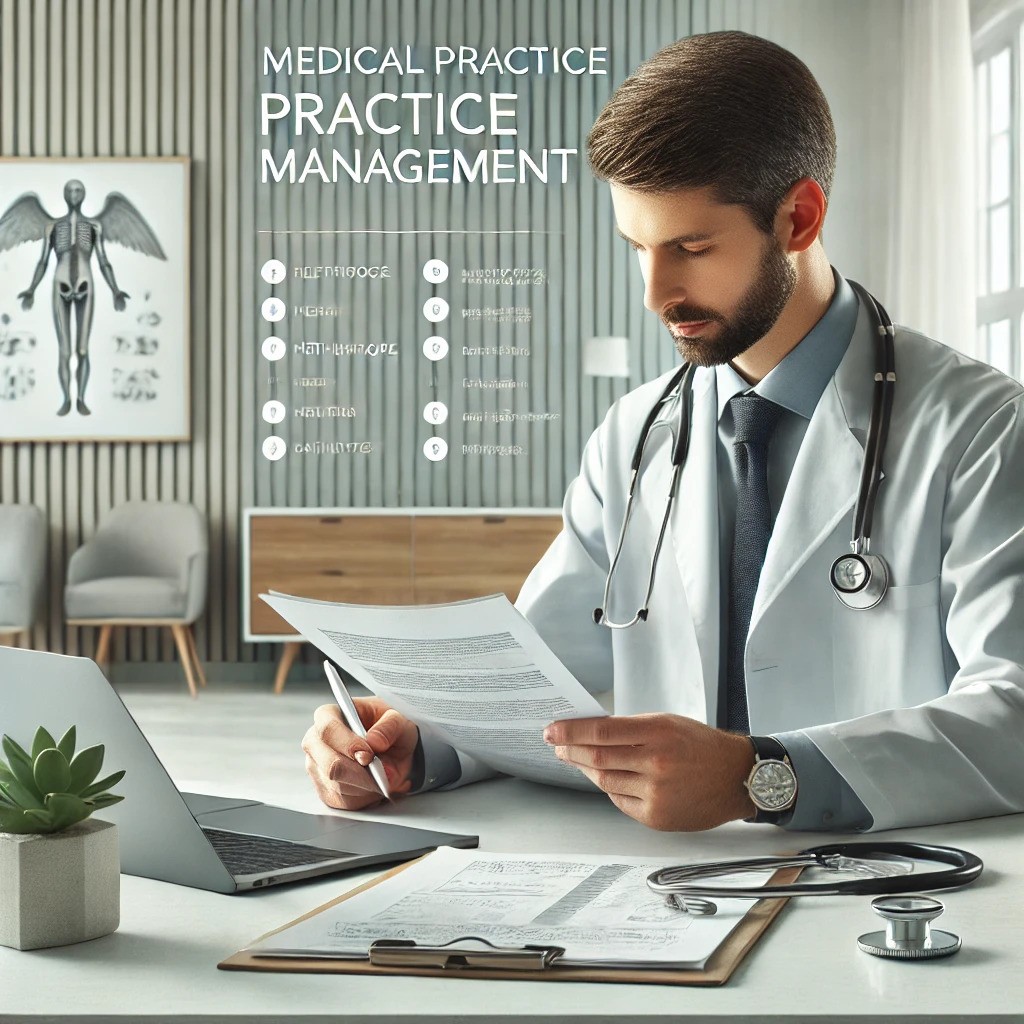
Managing a medical practice effectively is an essential yet complex task that requires a blend of administrative expertise, financial acumen, and a deep commitment to patient care. Whether running a small clinic or overseeing a large healthcare facility, medical practice management is the cornerstone of operational success. This guide explores the essentials of medical practice management, its key components, challenges, and strategies for achieving excellence.
What is Medical Practice Management?
Medical practice management encompasses the administrative and operational tasks that ensure a healthcare facility runs smoothly. These tasks include scheduling, billing, compliance with regulations, staff management, and patient care coordination. It is the backbone of a successful practice, allowing healthcare providers to focus on delivering quality care.
Key Components of Medical Practice Management
-
Patient Scheduling and Communication
-
Efficient appointment scheduling reduces wait times and optimizes the provider’s time.
-
Effective communication informs patients about appointments, test results, and follow-up care.
-
-
Revenue Cycle Management (RCM)
-
Includes billing, coding, and insurance claim processing.
-
Accurate RCM minimizes claim denials and ensures timely reimbursements.
-
-
Staff Management
-
Involves hiring, training, and retaining qualified personnel.
-
Promotes teamwork and a positive work environment.
-
-
Regulatory Compliance
-
Adherence to healthcare laws such as HIPAA ensures patient data security.
-
Regular audits help maintain compliance and avoid penalties.
-
-
Technology Integration
-
Use of electronic health records (EHR) and practice management software.
-
Enhances efficiency and reduces administrative burdens.
-
Why is Medical Practice Management Important?
-
Enhanced Patient Care:
-
Streamlined operations allow healthcare providers to focus more on patient care.
-
-
Operational Efficiency:
-
Optimized workflows reduce delays and increase productivity.
-
-
Financial Stability:
-
Proper billing and cost management ensure steady revenue.
-
-
Compliance Assurance:
-
Staying compliant with regulations protects the practice from legal risks.
-
-
Scalability:
-
Effective management supports the growth and expansion of the practice.
-
Challenges in Medical Practice Management
-
Evolving Regulations:
-
Keeping up with changing healthcare laws and standards.
-
-
Billing Complexities:
-
Managing coding errors and insurance denials can be time-consuming.
-
-
Staff Turnover:
-
High attrition rates disrupt workflows and increase hiring costs.
-
-
Technology Adoption:
-
Implementing and maintaining new technologies requires significant investment.
-
-
Patient Expectations:
-
Balancing quality care with operational efficiency to meet patient demands.
-
Strategies for Effective Medical Practice Management
-
Implement Advanced Technology:
-
Use EHR systems and practice management software to automate tasks.
-
Invest in telemedicine platforms for virtual consultations.
-
-
Focus on Staff Development:
-
Provide regular training and opportunities for skill enhancement.
-
Foster a culture of teamwork and collaboration.
-
-
Enhance Patient Engagement:
-
Utilize patient portals for scheduling, communication, and accessing records.
-
Collect and act on patient feedback to improve services.
-
-
Optimize Revenue Cycle Management:
-
Regularly audit billing processes to identify inefficiencies.
-
Train staff on accurate coding and claim submissions.
-
-
Stay Compliant:
-
Partner with legal experts to navigate regulatory changes.
-
Conduct regular compliance audits.
-
The Role of Technology in Medical Practice Management
-
Electronic Health Records (EHR):
-
Centralizes patient data for easy access and sharing.
-
Reduces paperwork and administrative overhead.
-
-
Practice Management Software:
-
Streamlines scheduling, billing, and reporting.
-
Enhances overall operational efficiency.
-
-
Telemedicine Tools:
-
Expands patient access to care and reduces no-show rates.
-
Offers cost-effective solutions for remote consultations.
-
-
Data Analytics:
-
Provides insights into patient trends and practice performance.
-
Supports informed decision-making.
-
Measuring Success in Medical Practice Management
Key Performance Indicators (KPIs) help gauge the effectiveness of management strategies. Common KPIs include:
-
Patient Satisfaction:
-
Monitored through surveys and feedback.
-
-
Revenue Growth:
-
Analyzing income trends to ensure financial health.
-
-
Operational Efficiency:
-
Assessing appointment wait times and staff productivity.
-
-
Compliance Rates:
-
Tracking adherence to healthcare regulations.
-
-
Patient Retention:
-
Evaluating the percentage of returning patients.
-
Future Trends in Medical Practice Management
-
Artificial Intelligence (AI):
-
Automates administrative tasks and enhances diagnostic accuracy.
-
-
Value-Based Care:
-
Focus on patient outcomes rather than service volume.
-
-
Cloud-Based Solutions:
-
Facilitates data storage and access from multiple locations.
-
-
Patient-Centric Models:
-
Increased emphasis on personalized care and engagement.
-
-
Sustainability Initiatives:
-
Eco-friendly practices to reduce the environmental footprint.
-
Tips for Success in Medical Practice Management
-
Set Clear Goals:
-
Define measurable objectives for staff and operational outcomes.
-
-
Regular Training:
-
Keep the team updated on industry trends and best practices.
-
-
Leverage Partnerships:
-
Collaborate with third-party vendors for specialized tasks like billing.
-
-
Invest in Patient Relationships:
-
Build trust through transparent communication and quality care.
-
-
Monitor and Adapt:
-
Continuously review performance metrics and refine strategies.
-
Conclusion
Medical practice management from the best Health Solutions and Services in USA is the cornerstone of a successful healthcare facility. Practices can achieve operational excellence and financial stability by focusing on technology, staff development, and patient engagement. Although challenges such as regulatory changes and patient expectations persist, effective strategies and tools can help overcome these hurdles.
Investing in robust management practices ensures that healthcare providers can focus on their primary mission: delivering exceptional patient care. Whether you’re managing a small clinic or a large facility, mastering medical practice management is the key to long-term success.





Leave a Reply